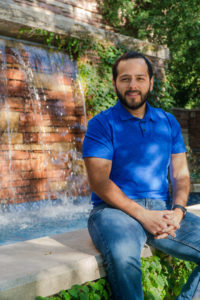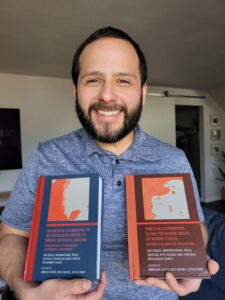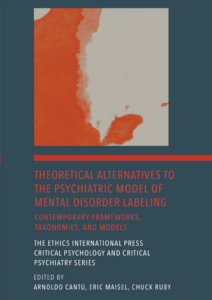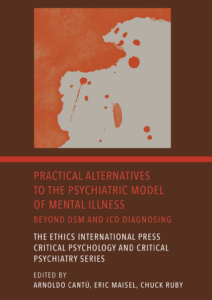
The biomedical model of mental health care is wrought with challenges, according to its critics. Challenges and dilemmas include sticky yet questionable diagnoses that can affect future prospects and people’s sense of identity, providers may find themselves in conflict between providing proper care and ensuring insurance coverage, and the widespread use of psychiatric medication with uncertain efficacy.
To shift the field of mental health care away from the biomedical model and towards something more descriptive, non-medicalizing and -pathologizing , Colorado State University Social Work Ph.D. student and practicing psychotherapist, Arnold Cantú, along with co-editors Eric Maisel and Chuck Ruby, edited over 50 chapters of submissions from scholars around the world to complete two new volumes in the Ethics International Press Critical Psychology and Critical Psychiatry Series: Practical Alternatives to the Psychiatric Model of Mental Illness: Beyond DSM and ICD Diagnosing, and Theoretical Alternatives to the Psychiatric Model of Mental Disorder Labeling: Contemporary Frameworks, Taxonomies, and Models, both published in February 2024.
“Having a Ph.D. student edit two volumes of a large publication such as this doesn’t happen often and is an achievement to be widely celebrated,” said Matthew Hickey, associate dean for research and graduate programs at the College of Health and Human Sciences.
On the accomplishment of editing these volumes, Cantú said, “I was pleased to finally be able to hold them in my hands.”
Critical perspectives of the biomedical model

Cantú’s work revolves around critical perspectives of mental health.
“What I have found is that, at least here in the U.S., primarily because of insurance and federal regulations, you need a diagnosis to get your services covered by insurance. But that pigeonholes clients and clinicians alike, and creates potentially adverse outcomes for people when they have to be diagnosed with highly contested and questionable ‘mental disorders’ to receive care,” he said. “Getting help from a therapist should be as simple as getting help from an auto mechanic or accountant.”
One critique Cantú and other scholars have of the biomedical model is how distressing thoughts, emotions, and behaviors are studied. According to Cantú, typically practitioners or researchers in medical fields outside of psychiatry see a symptom being displayed and attempt to trace it back to discretely identifiable biomarkers, such as symptoms of COVID being traced back to the detection of SARS-CoV-2 in the body.
According to Cantú and other critics of the biomedical model, “mental disorders” are observed en masse — and since language is needed to describe them, they are deliberated on and created by the psychiatric community, and then research is done to try and find discrete and identifiable biomarkers. In other words, these “mental disorders” are a solution looking for a problem.
“To me, there is a pretty stark division between a physical medical diagnosis and what’s considered a psychiatric diagnosis or mental illness,” Cantú said. “Most medical diagnoses can be objectively identified in the person with the help of testing, laboratory measurements, scans, et cetera, whereas for mental illness, that hasn’t been the case.”
Large organizations around the world have long funded research focused on identifying biomarkers but have not found anything to scientifically validate mental disorders as actual diseases in the conventional medical sense.
“They have proclaimed certain illnesses to exist and then are looking for biological causes whereas with the rest of medicine, you typically do things in reverse – you find clusters of symptoms and then determine discretely identifiable causes or signs before proclaiming it to be a kind of medical illness or disease,” Cantú said. “My thinking is: there is not anything there, and you’re not going to find it because you’ve done things backwards. The harm is: the language has been let loose – it’s permeated everything without scientific and biological backings, and you can’t put the genie back in the bottle.”
Shifting the narrative
 Cantú recognizes that these critical perspectives are often unpopular. “In some ways it is like I am entering this marketplace of ideas, and my ideas aren’t very popular or have much buy-in,” he said. “However, hopefully with time they will, and it can start to slowly shift some things. My arguments and recommendations are only meant to empower and bolster people’s sense of self-worth, abilities, and hope. I want people to be able to receive care without having to be seen as broken by others, or themselves, if they receive a diagnosis of being ‘mentally ill.’”
Cantú recognizes that these critical perspectives are often unpopular. “In some ways it is like I am entering this marketplace of ideas, and my ideas aren’t very popular or have much buy-in,” he said. “However, hopefully with time they will, and it can start to slowly shift some things. My arguments and recommendations are only meant to empower and bolster people’s sense of self-worth, abilities, and hope. I want people to be able to receive care without having to be seen as broken by others, or themselves, if they receive a diagnosis of being ‘mentally ill.’”
The shifts Cantú would like to make are to influence how mental health providers are trained to think about suffering and distress, and eventually how people view their own suffering and distress — away from the deficit-minded model of disease and towards a descriptive approach that asks “what has happened to you and how can we help you?” This would be in lieu of diagnosing disorders and prescribing medications as a typical first line of defense.
“Psychiatric drugs can help, but what they’re addressing within the person is not a disease, illness or pathology,” Cantú said. “Because that illness or pathology has never been properly identified.”
 Cantú says the chapters of the new books are mostly easy-going and enjoyable to read and cover vast terrain from practical and philosophical alternatives to the biomedical model – an intentional choice to pique the interest of readers. “My hope is readers can expand their thinking about mental disorders and illnesses and obtain a vantage point outside of the waters we swim in, and think about what mental disorders are and aren’t or even perhaps begin to reject the idea of mental disorders as a whole,” Cantú said.
Cantú says the chapters of the new books are mostly easy-going and enjoyable to read and cover vast terrain from practical and philosophical alternatives to the biomedical model – an intentional choice to pique the interest of readers. “My hope is readers can expand their thinking about mental disorders and illnesses and obtain a vantage point outside of the waters we swim in, and think about what mental disorders are and aren’t or even perhaps begin to reject the idea of mental disorders as a whole,” Cantú said.
Ultimately, Cantú and other critics of the biomedical model are searching for a way to move entirely away from the “mental illness” language. When someone presents with what we typically refer to as anxiety or depression, it is often an understandable response to something happening to or around them, rather than something that is pathological or wrong within them, according to Cantú.
“If a husband and wife are married for decades, the wife passes away, and now the husband has lost his will to live, his appetite, is profoundly sad, and has retreated from life, why does his grief magically become a mental illness or ‘prolonged grief disorder’ after one year with no identifiable biomarker deeming it an illness?” Cantú said.
“Ultimately, we’re hoping to slowly shift the mental health zeitgeist and ethos of how people are being trained to become therapists and how we all can understand our own suffering in different ways,” Cantú said.
Ready for an opportunity
Cantú got connected to Maisel after pitching a paper for an earlier volume of the Ethics International Press Critical Psychology and Critical Psychiatry Series. After some back and forth, Maisel offered Cantú the opportunity to edit a future volume on the topic of his paper, which put forth an alternative taxonomy for mental health. “I thought, ‘Why not? I’m not going to pass up the opportunity!’” he said.
The one volume quickly ballooned up into two volumes given the immense interest by contributors around the world. Many late nights and hundreds of pages later, Cantú and his co-editors have the completed volumes.
Cantú said the inception of this was serendipitous, but he was ready and excited to seize the opportunity. “I happened to get a paper published and reached out to this particular author at the time a series was being worked on – he offered and I was ready,” he said.
Perhaps there are lessons here for other graduate students, or people in general, Cantú shares. “I never would have thought I could do this before I applied to grad school,” he said. “Take a risk here and there. Stretch yourself a bit. Yes, there were some sacrifices, but I’m glad I took this opportunity. We’re likely capable of more than we think.”
Cantú recognizes that learning about these critical perspectives can feel destabilizing and has provided two resources to further your learning beyond this article. If you would like to explore this topic more, Cantú recommends the Learn/Unlearn webpage from The Inner Compass, and the Unrecognized Facts webpage from The Council for Evidence-based Psychiatry.
The School of Social Work is part of CSU’s College of Health and Human Sciences.